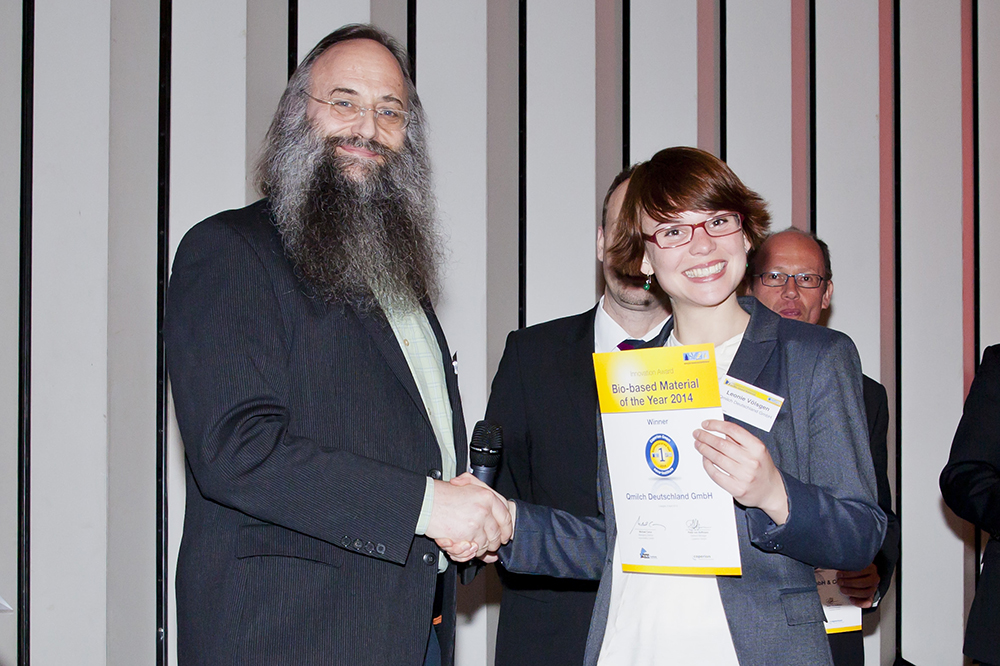
The first day featured policy and strategy as well as biorefineries. Bio-based building blocks, polymers and composites gained centre stage at the second day, and start-ups presented their latest inventions at the third day of the conference.
The participants chose the winner of the Innovation Award at the first day. Qmilch Germany GmbH (DE) won first place, followed by fischerwerke GmbH & Co.KG (DE). Two companies shared third place: Hemp Eco Systems SA (CH) and ZinCo GmbH (DE).
The “7th International Conference on Bio-based Materials” provided major players from the European bio-based chemical, plastics and composite industries with an opportunity to present and discuss their latest developments and strategies. Representatives of political bodies and associations had a say alongside leading companies. For the first time, the conference featured a third day dedicated to start-up companies to put them in touch with investors and industry.
It is one of the biggest conferences worldwide and provided also this year an excellent platform for networking with more than 160 participants from all over the world and an exhibition. One highlight of the conference was the presentation of the first few operational European biorefineries and a status report on industrial biotechnology.
The bio-based economy, and especially the area of bio-based materials, is one of the key drivers of innovative and sustainable development of the economy and industry as a whole. Bio-based plastics and their building blocks are the true centre of attention. More and more companies are entering this field, and Europe is one of the key regions – but it is under great pressure from Asia as well as North and South America. Sponsored by BIOTEC (www.biotec.de) and InfraServ Knapsack (www.infraserv-knapsack.de), the 7th International Conference on Bio-Based Materials presented the leading players in this race to establish a European bio-based economy for the future.
The presentations held up the high standard of former years, giving deep insight on the present state and future vision of biomass-based products.
All presentations are free available for the participants, everyone else can get them for 150 €: http://bio-based.eu/proceedings/
Latest policies, strategies and visions for Europe’s bio-based future
A new framework is needed to build a strong and innovative European bio-based economy – and this includes policies, investments and companies. Although European companies are among the biggest and most innovative companies in the world, particularly in the chemical and polymer industry, various barriers and hurdles must be overcome. The right frameworks and well-thought-out ideas are needed to create a perfect backbone for the development of this future economy. Leading experts presented and discussed their policies, strategies and visions for Europe’s bio-based future.
Dr. Reinhardt Büscher (European Commission, DG Enterprise and Industry), Henk van Liempt (Federal Ministry of Education and Research of Germany) and Dr. Dr. h.c. Christian Patermann confirmed the need of a new political framework more in favour of bio-based chemicals and materials to develop the bio-based economy – although a quick establishment is hardly possible.
Rafael Cayuela from Styron Europe GmbH (CH) discussed global trends and the future of the worldwide chemical industry, especially impacts of the on-going climate protection policy. Prof. Dr. Stefaan de Wildeman, Aachen-Maastricht Institute for Biobased Materials (NL), showed the future in new bio-based building blocks which allow decentralised biopolymer production. Mario Bonaccorso of Assobiotec, the Italian Association for the Development of Biotechnology (IT), saw great growth opportunities for the Italian economy in the bio-based economy.
Michael Carus of nova-Institut GmbH (DE) gave the first public presentation of the comprehensive nova paper on reforming the Renewable Energy Directive (RED) which aims to level the playing field for material and energetic use of biomass: To open the RED for bio-based chemicals and materials, to develop the RED to a REMD – “Renewable Energy and Material Directive”.
Commercial biorefineries in Europe – they already exist!
Many of the discussions and research projects in Europe focus on biorefinery technologies. Those large integrated systems designed to produce all types of products such as chemicals, polymers and fuels from biomass are seen as the future of the bio-economy. What is generally overlooked: the first biorefinery concepts are already in place and commercially operating. Arizona Chemical is the world’s leading pine chemical company and presented their Swedish biorefinery; as well as Borregaard from Norway with decades of experience in biorefining of wood. Also Novamont from Italy and ARD from France reported on their latest biorefinery developments.
Bio-based building blocks are the key to new sustainable materials
In the last few years, many new innovations have taken place in the field of bio-based building blocks and platform chemicals for the chemical industry. The field of polymers and plastics has evolved, and several innovations have been made e.g. polylactic acid (PLA), polyhydroxic alkanoates (PHAs), polyamides (PA) and drop-in solutions (PET, PE). But the main recent innovations have been new production plants for several bio-based building blocks like succinic acid, isobutene, butadiene, butanediol and furan-based chemicals – being a precursor for bio-based polymers.
The mentioned bio-based building blocks were the focus of the conference’s second day, during which companies such as Reverdia (NL/FR), Global Bioenergies (FR) – with their latest investment in Leuna Chemical Park (DE) – SEKAB (SE), Corbion (NL), Arkema (FR), SOPREMA (FR), Succinity (DE/NL), Novozymes (DK), Avantium (NL) and Myriant, a special guest from the US, presented their latest innovations and investments, as well as their experiences of producing bio-based building blocks and polymers. They gave a focused overview especially in recent developments in the area of the opportunities and hurdles of a ethanol-based chemistry, on lactic acid and PLA, on succinic acid production and the challenges for the production of PBS and other applications, as well as on polyamides, furane-based polymers (PEF) and polyurethanes for elastomers. The nova-Institute presented new market opportunities for biodegradable polymers arising from environmental problems of conventional plastics caused by microparticles, especially in the sea.
In cooperation with Asta Eder Composites Consulting (AT/FI) the nova-Institute also presented the recent market study on Wood-Plastic Composites and Natural Fibre Composites, EcoTechnilin (FR) and Advanced Compounding Rudolstadt (DE) followed with specific examples. The Public Research Center Henri Tudor (LUX) gave an insight into nanocellulose and its markets.
Start-up companies present their technologies and latest developments
In cooperation with BCNP Consultants (www.bcnp.com), BIO.NRW Business Angels (www.bio.nrw.de/business_angels) and CLIB2021 (www.clib2021.de), the third day featured for the first time start-ups that had been invited to present their technologies and latest developments in the field of biotechnology and related technologies to industry and potential investors. Due to the very good response there will be a start-up day next year: Almost all start-ups found contacts and companies interested in their technologies.
“Bio-based Material of the Year 2014” Innovation Award
More information at http://www.biowerkstoff-kongress.de/award
For the seventh year running, the Innovation Award “Bio-based Material of the Year” has been awarded to the young, innovative bio-based industry, that finds suitable applications and markets for bio-based materials. The competition focuses on new developments in these areas, which have been (or will be) launched onto the market in 2013 and 2014, but exclusively from Europe this time round. A jury consisting of representatives of nova-Institute nominated the “Top 7” outstanding applicants from 20 submissions prior to the conference. Each of the seven companies gave a ten minute presentation to introduce its innovation. The participants of the conference elected the four winners. One of the leading compounding and extrusion company Coperion (www.coperion.com) is the Innovation Award sponsor for years.
Qmilch won first place with its compostable and antibacterial casein-based polymer Qmilk. Casein is a milk protein that Qmilch extracts from non-food milk in order to give an added value to waste milk. The second place was attributed to the company fischerwerke who presented the first bio-based injection mortar, the FIS Green 300 T. For the first time, two companies are placed equal third: Hemp Eco Systems and ZinCo. Hemp Eco Systems offers a hemp-based building material with high thermal insulation and easy application. ZinCo provides a bioplastics solution for green roofing.
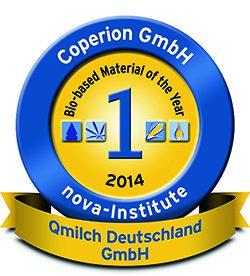 1st place: Qmilch Deutschland GmbH, Germany www.qmilk.eu – Qmilk: The fiber made of milk
1st place: Qmilch Deutschland GmbH, Germany www.qmilk.eu – Qmilk: The fiber made of milk
Qmilk produces a 100 % natural textile fiber based on the casein, a milk protein – utilized from Non-Food-Milk. In spring 2014, the start-up from Hanover begins the production of Qmilk fiber for fashion, sportswear and home textiles. The new fiber feels like silk, is compostable, suitable for allergy sufferers, and even antibacterial. The production process takes solely five minutes, demands temperatures of only 80 °C and max. 2 litres of water per kilogram fiber.
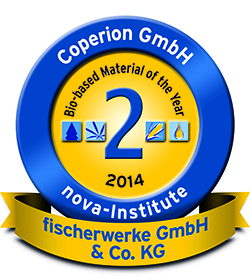 2nd place: fischerwerke GmbH & Co. KG, Germany www.fischer.de – FIS Green 300 T: The first bio-based injection mortar
2nd place: fischerwerke GmbH & Co. KG, Germany www.fischer.de – FIS Green 300 T: The first bio-based injection mortar
FIS Green 300 T is the first chemical injection mortar which contains bio-based components. Chemical injection mortars are complex mixtures consisting of a multitude of different raw materials for each of which green substitutes were examined. This radical product redesign approach made it possible to achieve a high bio carbon content of 50-85 %. FIS Green 300 T demonstrates that it is possible to re-formulate even complex products to make them bio-based and more sustainable.
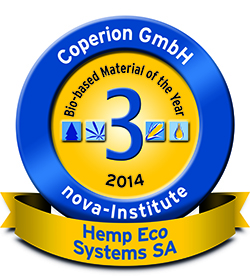 3rd place: Hemp Eco Systems SA, Switzerland www.hempecosystems.ch – HES-mix: The hemp-based building insulation
3rd place: Hemp Eco Systems SA, Switzerland www.hempecosystems.ch – HES-mix: The hemp-based building insulation
A building material made from hemp shivs, lime, natural minerals and water. It is used to construction material with good thermal insulation, creating a good living environment. In can be used for walls, under roof, and for floors.
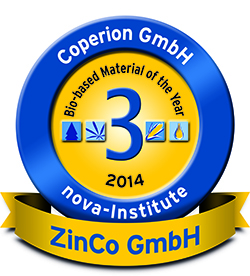 3rd place: ZinCo GmbH, Germany www.zinco-greenroof.com – Natureline: Green roofing for the 21st century
3rd place: ZinCo GmbH, Germany www.zinco-greenroof.com – Natureline: Green roofing for the 21st century
As a pioneer in matters of green roofing, ZinCo has been consistent in treading the environmental path for over forty years. ZinCo system substrates are based on recycled clay brick. Where possible, recycling materials are used for drainage elements and protection mats. ZinCo has now taken yet another innovative step and introduced the market the system build-up “Natureline”, made from bioplastics – mats from PLA-fibres and bio-based PE.
From end of April all presentations will be free available for the participants, everyone else can get them for 150 €: www.nova-shop.info
Photos from the 7th International Conference on Bio-based Materials 2014 (please include the source):
You can download photos of the conference at this link:
http://biowerkstoff-kongress.de/media/14-04_Conference_Pictures_nova.zip
The zip-file includes:
- expert_panel.jpg: f.l.t.r.: Dr. Stefaan de Wildeman (Aachen-Maastricht Institute for Biobased Materials), Rafael Cayuela (STYRON Europe GmbH), Henk van Liempt (Federal Ministry of Education and Research of Germany), Dr. Reinhard Büscher (European Comission, DG Enterprise and Industry), Dr. Dr. h.c. Christian Patermann (EU-Comission, Advisor and Member of the 1st German Bioeconomy Council) and Mario Bonaccorso (Assobiotec) (photo: nova)
- participants.jpg: Participants during discussion (photo: Vollmer)
- award_winners.jpg: The winners of the Innovation Award 2014. F.l.t.r.: Florence Aeschelmann, Michael Carus (nova-Institute), Leonie Völsgen (Qmilch), Dr. Martin Vogel (fischerwerke), Dieter Schenk (ZinCo), Jorgen Hempel (Hemp Eco Systems), sponsor: Peter von Hoffmann (Coperion) (photo: PvP/nova)
- award_ceremony.jpg: f.l.t.r.: Michael Carus (nova-Institute), Peter von Hoffmann (Coperion), Leonie Völsgen (Qmilch) (photo: PvP/nova)
- award_ceremony2.jpg: Michael Carus from nova-Institute congratulates the winner of the Bio-based Material of the Year 2014 Award Leonie Völsgen from Qmilch (photo: PvP/nova)
- 1st_place_Qmilch.jpg: Qmilk fibre made of milk (photo: Qmilch Deutschland GmbH)
- 2nd_place_fischerwerke.jpg: bio-based injection mortar (photo: Fischerwerke GmbH)
- 3rd_place_Hemp.jpg: hemp-based building isolation (photo: Hemp Eco Systems SA)
- 3rd_place_ZinCo.jpg: green roofing (photo: ZinCo GmbH)
- 1_Badge_Bio-based_Material_of_the_Year_2014_Qmilch.jpg
- 2_Badge_Bio-based_Material_of_the_Year_2014_fischerwerke.jpg
- 3_Badge_Bio-based_Material_of_the_Year_2014_Hemp_Eco.jpg
- 3_Badge_Bio-based_Material_of_the_Year_2014_ZinCo.jpg
- collage_award_nominees.jpg: Collage of the products nominated for the Bio-based Material of the Year 2014 Award (photo: nova)
Download this press release as PDF file: 14-04-22 PR International Conference on Bio-based Materials nova
Responsible under press legislation (V.i.S.d.P.):
Dipl.-Phys. Michael Carus (Managing Director)
nova-Institut GmbH, Chemiepark Knapsack, Industriestrasse 300, DE-50354 Huerth (Germany)
Internet: www.nova-institute.eu and www.bio-based.eu
Email: contact@nova-institut.de
Phone: +49 (0) 22 33-48 14 40
nova-Institute is a private and independent institute, founded in 1994; nova offers research and consultancy with a focus on bio-based and CO2-based economy in the fields of feedstock, techno-economic evaluation, markets, LCA, dissemination, B2B communication and policy. Today, nova-Institute has more than 20 employees and an annual turnover of about 2 Mio. €.
Source
nova-Institut GmbH , press release, 2014-04-22.
Supplier
Aachen-Maastricht Institute for Biobased Materials (AMIBM)
Advanced Compounding Rudolstadt GmbH (ACR)
Arizona Chemical
Arkema
Assobiotec (Italian Association for the Development of Biotechnology)
Asta Eder Composites Consulting
Avantium Technologies B.V.
BCNP Consultants
Bio.NRW Business Angel Network
BIOTEC GmbH & Co. KG
Borregaard
Bundesministerium für Bildung und Forschung (BMBF)
Cluster Industrielle Biotechnologie e.V. (CLIB2021)
Coperion
Corbion
EcoTechnilin
European Commission
fischerwerke Artur Fischer Gmbh & Co. KG
Global Bioenergies
Hemp Eco Systems SA
InfraServ-Knapsack
Leuna Chemical Park
Myriant Technologies LLC
nova-Institut GmbH
Novamont S.p.A.
Novozymes
Public Research Center Henri Tudor
QMilch Deutschland GmbH
Reverdia
SEKAB
SOPREMA Group
STYRON Europe GmbH
Succinity GmbH
ZinCo GmbH
Share
Renewable Carbon News – Daily Newsletter
Subscribe to our daily email newsletter – the world's leading newsletter on renewable materials and chemicals










